



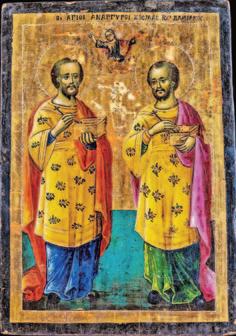

See page 6







See page 6
Considered the first of its kind since the 1980s, the forum will feature prominent policy makers and thought leaders discussing approaches to nuclear disarmament and deterrence
A groundbreaking discussion in September at the University of New Mexico will feature highranking public policy experts, influential spiritual leaders, and prominent academics exploring strategic and ethical responses to one of the most urgent issues facing humanity: the rising threat of nuclear war.
“Forum on Nuclear Strategy: Disarmament & Deterrence in a Dangerous World” will be held on Saturday 7 September 2024. Considered the first of its kind since the American Catholic bishops reshaped the nuclear weapons debate in the 1980s, the forum is led by the Institute for Advanced Catholic Studies at the University of Southern California, the Endowed Chair of Roman Catholic Studies at the University of New Mexico, and UNM’s Religious Studies Program.
“The forum is an important opportunity for experts in religious and secular fields to learn from each other as they explore modern nuclear strategy decisions,” said Most Rev. John C. Wester, Archbishop of Sante Fe, whose 2022 pastoral letter Living in the Light of Christ’s Peace: A Conversation Toward Nuclear Disarmament calls for dynamic discussion on nuclear disarmament. “It’s precisely these conversations that will lead to a clearer understanding of the threat that nuclear weapons pose and how best to navigate the waters of the perilous arms race we find ourselves in today.”

The forum will include nuclear experts, policy makers, and the intellectual architects of disarmament and deterrence approaches to nuclear weapons policy from Catholic and secular strategic perspectives discussing solutions aimed at securing long-lasting peace across the globe.
“With regional conflicts escalating and the threat of nuclear war rising, humanity is at a critical moment,” said Dr. Richard L. Wood, president of the Institute for Advanced Catholic Studies at USC. “Our forum will be a platform for in-depth discussion and debate that will explore our current global realities and seek tangible solutions to the rising threat of nuclear conflict.”
“It’s important that we host this discussion near the birthplace of nuclear weapons and with leading experts from differing perspectives regarding nuclear strategy,” Dr Wood added.
Along with the Los Alamos and Sandia nuclear weapons laboratories, the region is home to the Trinity Site, where the first atomic bomb was detonated on 16 July 1945, and the Kirtland Underground Munitions Maintenance and Storage Complex, the largest storage site of nuclear warheads in the U.S. arsenal.
Among the forum’s participants will be: Rose Gottemoeller, former deputy secretary general of NATO and former U.S. undersecretary of State for Arms Control and International

Security; Thomas Countryman and Christopher Ford, both former U.S. assistant secretaries of state for International Security and Nonproliferation (Obama & Trump administrations respectively); Thomas “Thom” Mason, director of Los Alamos National Laboratory; Cardinal Robert McElroy, Bishop of San Diego; Most Rev. Joseph Mitsuaki Takami, Archbishop Emeritus of Nagasaki; Maryann Cusimano Love, associate professor of International Relations, The Catholic University of America; Richard Love, professor of National Security Strategy, the National Defense University; Gerard Powers, director of Catholic Peacebuilding Studies at the University of Notre Dame’s Kroc Institute for International Peace Studies; and thought leaders representing local residents and Indigenous communities impacted by nuclear weapons testing.
Participants will explore how strategic and ethical thinking regarding nuclear weapons needs to be reconsidered today in light of the geo-political rivalries between the U.S., a rising China, revanchist Russia, and smaller national actors. Those rivalries could all too quickly degenerate into nuclear war — a scenario made more urgent by the rise of cyberwarfare, hypersonic weapons, and the new potential for AI-generated cyberweapons to take control of the nuclear strike capacities of competing nations.
These risks have led multiple nations — including the U.S. — to expand their nuclear war-fighting capacity. This deterrence approach dominates modern strategic policies on nuclear arms. Meanwhile, some nuclear strategists through the last four decades — in part prompted by The Challenge of Peace, the pastoral letter published in 1983 by the U.S. Conference of Catholic Bishops — have argued that the only rational and ethical response to these realities is multilateral and verifiable nuclear arms control and disarmament.
The forum will be preceded by closed-door dialogue between the participants, in which they will challenge one another’s thinking and explore potential common ground. The public forum will include a report-out from the closed-door sessions, in which participants will summarize their own thinking and whether it might evolve in light of the dialogue; presentations from local community members; a chance for public reactions and dialogue with speakers; and a welcome reception featuring remarks from Archbishop Wester, along with a reflection by Archbishop Emeritus Takami, an in utero atomic bomb survivor who lost several members of his extended family in the 9 August 1945 atomic bombing on the city.
For more information please visit dornsife.usc.edu/iacs/nuclearproject/


CONTACT US:
The Catholic Post is published by its owners Bellcourt Ltd and is wholly independent of and separate from any previous newspaper. The Catholic Post is published on the last Sunday of the month previous to publication date.
EDITOR: Nick Layton
email: editor@catholicpost.co.uk
ADVERTISING:
Charlotte / Bellcourt Ltd.
01440 730399
charlotter@cathcom.org
DESIGN & LAYOUT:
David Lodge, davidl@cathcom.org
PUBLISHED BY:
Bellcourt Ltd. N2 Blois Meadow Business Centre, Blois Road, Steeple Bumpstead, Haverhill, Suffolk CB9 7BN
01440 730399
ARTICLES TO:
The Catholic Post
email: editor@catholicpost.co.uk or davidl@cathcom.org
Please send articles for publication by email, supplying any photos separate to the text We welcome contributions
Here are answers to some basic questions about writing for The Catholic Post How long should articles be?
Usually it seems to work out best if contributors simply say what they have to say and let us worry about finding a spot for it in the paper.
What is the submission procedure?
Please send as a Word file attached to an e-mail. To submit articles for publication, send to editor@catholicpost.co.uk
Charts, graphs, and photos should be submitted as separate PDFs. Electronic photos should not be embedded or pasted into a Word document as this reduces their quality.
Photographs and Illustrations
Photographs and Illustrations should be supplied electronically as high resolution JPEG (*.JPG) files).
Photographs and illustrations should be sent in colour with a resolution of 300 dpi and a minimum size of 100 mm x 100 mm when printed (approx. 1200 pixels wide onscreen).
Computer print-outs are not acceptable. Screen captures are not ideal as they are usually not very high
Parental permission should be sought before submitting photographs of minors.
Source information -
DW = Diocesan Website.
ICN = Independent Catholic News
Views expressed in The Catholic Post are not necessarily those of the editor
Last date for copy is the LAST DAY of the month prior to publication.
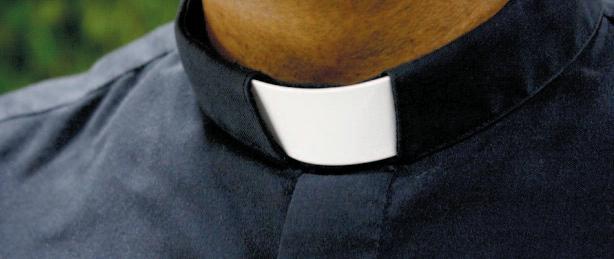
Maybe if God physically followed us round the house, sat in the car with us, took a seat at the business meeting or walked round the shops with us, it might remind us that he’s there
I don’t think any of us would dispute the importance of prayer, and we would also acknowledge the importance of regular times for prayer, but at the same time many of us struggle to put that into practice. Increasingly we are busy people and all too often there just aren’t enough hours in the day for all the things we have to do and all the commitments we have to meet, and yet where does our relationship with God and our spiritual life figure in our busy-ness and our commitments? Maybe if God physically followed us round the house, sat in the car with us, took a seat at the business meeting or walked round the shops with us, it might remind us that he’s there. And yet spiritually he does and he is, but because we don’t actually see him, or because we don’t recognise him, it’s easy to forget that he’s there, wanting to talk to us, waiting for us to talk to him.
We can, of course, talk to God in prayer at any time, but in terms of actual formal prayer time there are two things we need to do. The first is to develop a regular habit of prayer, to quite deliberately set aside prayer times throughout the day, and the second is the importance of creating a place for prayer, a place that is conducive to prayer, somewhere where we can be alone with God, somewhere free of all the usual noise and distractions above which we struggle to hear his voice.
Religious, in their convents or monasteries, are required to observe up to nine prayer times during the day and the night; secular priests have five prayer times from the Divine Office throughout their day. And we are quite familiar with the requirement of Muslims to pray five times a day, and in some Islamic countries everything stops at those times – shops and
businesses close and remain closed - until the muezzin signals the end of prayer. The call to prayer serves as a useful reminder to nonMuslims in those countries just as church bells do in our own, and the monastery “Angelus” bell used to for workers in the fields.
Morning and night prayer should be a minimal practice for us, but we should try to develop the habit of finding additional times for prayer throughout our day, planning them around our other activities or, better still, planning our activities around them. And that’s where my second suggestion comes in of finding a suitable place where we can be alone with God, as free as possible from all the distractions around us.
Even Jesus found this difficult to do. He tried to take his disciples away to quiet places where they could be alone to recharge their spiritual batteries, but it never seemed to work because people would set off to look for him and bring him back to their communities. In a busy family home, or in a busy workplace, it can be almost impossible to find undisturbed time and a quiet place for prayer. If we don’t find that quiet time, or if it fails to be respected by those around us, it should be no surprise if we begin to feel spiritually impoverished because our prayer life, our time spent with God in prayer, even just in silence, is suffering.
Through the prophet Isaiah, God says to each one of us: “Come to the water all you who are thirsty; though you have no money, come! Buy corn without money, and eat, and, at no cost, wine and milk… Listen, listen to me, and you will have good things to eat and rich food to enjoy. Pay attention, come to me; listen, and your soul will live. (Is 55 v 1-3) The Lord will feed us, will
nourish us spiritually, in proportion to how much we offer him the opportunity to do so. If we are always too busy, if we reach the end of the day and our prayer time has been notable by its absence, then we really need to do something about it.
And somehow family members have to realise and accept that we need that time and space for prayer - for God - just as they do also. So how about a family creating that time together by developing the practice of family prayer as a way of encouraging a little extra prayer time in the day in addition to our personal prayer? Prayer at the beginning and end of the day is more easily said, less easily missed, because they are quieter times of the day. I suppose the question is whether we are missing prayer simply because we forget or because we allow other things to take priority, or because there are quite legitimate demands on our time that we can’t simply walk away from.
Sometimes what we are doing simply isn’t compatible with prayer, but at other times our work can be prayer or we can pray while we are working - simple, short prayer that acknowledges our awareness of God-with-us. A traditional devotion such as the Rosary is easily said as we work or walk, not necessarily meditating on the mysteries if we can’t remember them, but just to make it - in the nicest sense of the word - a “background” to our activity, bringing God and, in this case, Our Lady, into our day and into what we are doing.
Thinking about the friends we have, much of what enriches those friendships has to do with how often we see them and how much and how often we talk with them. As with friends, so with God. He is always there wanting to talk to us, waiting for us to talk (and to listen!) to him. In order for our relationship with God to be enriched and nourished, time spent with him in prayer only at the start and end of our day may not be enough, and especially if that time too is sometimes missed. Perhaps the ultimate test, the ultimate question we need to ask ourselves, is whether all too often we are too busy for God.
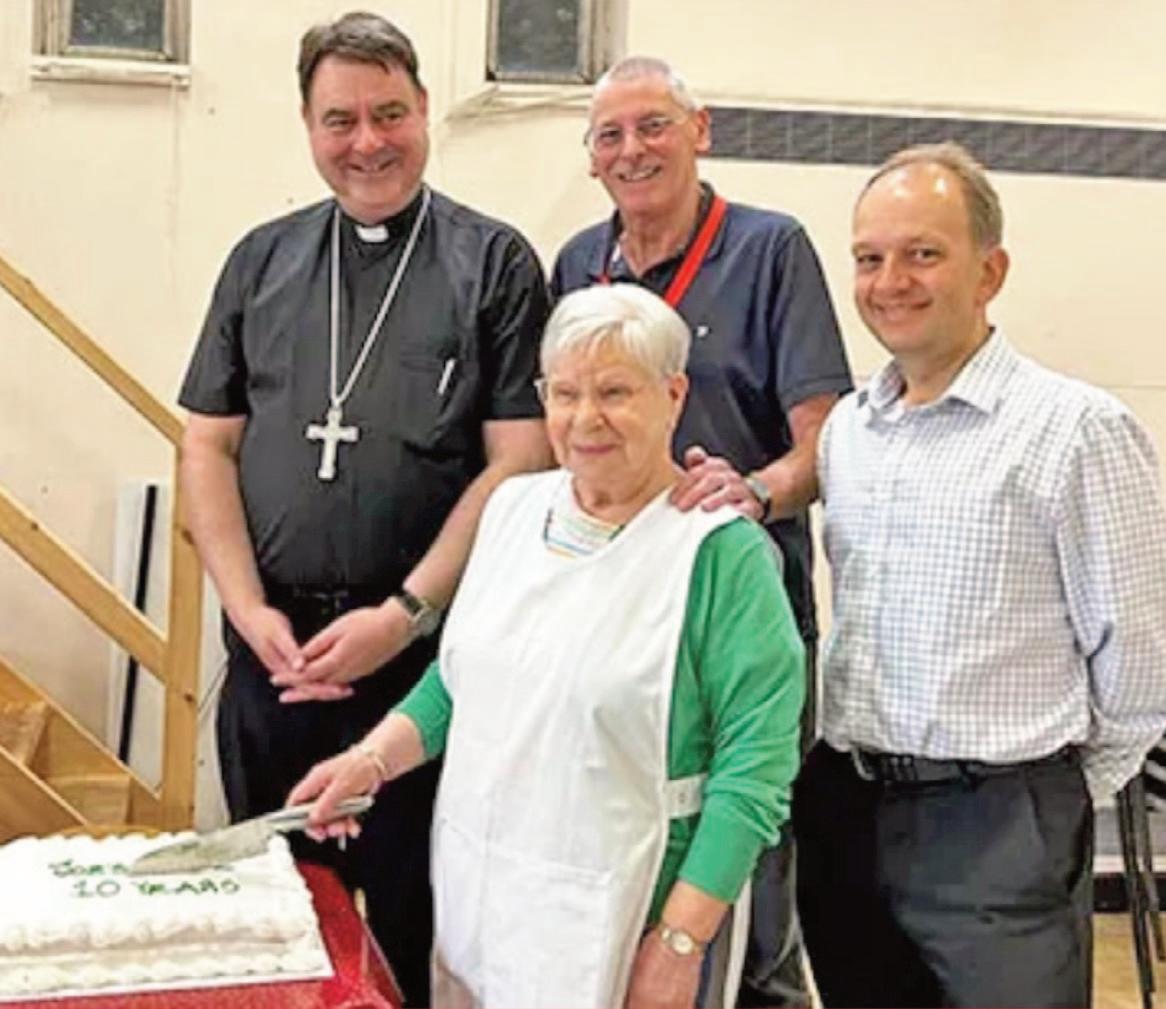
due to all the volunteers who work here, the John Ingram Partnership, St Cuthbert’s Care and all the local voluntary and statutory agencies that support the project. We pray that all of us, especially the Church, will always be mindful of the need to serve the needs of the poor and we urge political leaders to tackle the problem of poverty in our area.”
This month many priests change to a new parish. This is not just difficult for the parishioners themselves, who may have been reluctant to part with the priest that had been with them for many years, but for the priests also. Faced with leaving a community that is familiar, is no easy task.
A priest belongs to no-one. He goes where he is called, to continue the work of the Lord in his new parish. But he needs welcome, just as any other person. He may feel nervous at the prospect of entering a new and unknown parish community, both priest and parish may be very different to the situation experienced before.
It takes a while to settle into a new place of residence, meet new people and become part of a new routine. The trusted faces are not there to assist and even the stove looks unfamiliar!
So please do not judge your priest, give him time to get to know you and give him space to be himself. Above all keep him in your prayers.
Similarly, many children will go to school for the first time. It is a difficult transition for both child and parents, and we hope the following prayer may assist:
A Mother’s Prayer for Her Children
As thou didst walk the fields of Galilee, O loving Saviour walk with them for me: For since the years have passed and they have grown I cannot follow, they must walk alone. Be thou my voice when sinful things draw near pleading with them for all that will endure. Be thou the hand that would keep theirs in mine and all things else a mother must resign. And as Thy Blessed Mother guided Thee O kind and loving Jesus, guide my boys and girls for me.
www.crownofthorns.org.uk office@crownofthorns.org.uk

Mission of Hope
Joe’s Place, a community project in Gateshead established in collaboration with local parishes and St Cuthbert’s Care, has celebrated 10 years of dedicated service to the local community.
Every Wednesday, the weekly drop-in Centre, hosted in St Joseph’s parish hall, welcomes around 100 people. An amazing team of dedicated volunteers provides a delicious home-cooked meal, essential warm clothes, and friendly conversation to individuals across the Gateshead area.
The project opens its doors to everyone, offering good food, a hot drink, a chat and
companionship – no questions asked. As volunteer coordinator Wilf McNeany often says, “You could be a millionaire or have nothing and you would be welcome to share a free meal and friendly chat at Joe’s Place.”
In celebration of the 10th anniversary, Bishop Stephen Wright and St Cuthbert’s Care Chief Executive Nic Gilbert joined volunteers and guests in the usual Joe’s Place way by sharing a cup of coffee, a slice of cake and a chat!
Bishop Stephen Wright remarked, “It’s an absolute pleasure and a privilege to celebrate the 10th anniversary of Joe’s Place. Thanks are
Run by a team of dedicated volunteers, Joe’s Place offers a varied menu with full table service – from taking individual orders to delivering meals to the table.
“We are delighted to play a small part in the success of Joe’s Place as it continues to provide hope and support to people across Gateshead. It’s a true demonstration of compassion and community spirit,” said Nic Gilbert.
If you would like to help Joe’s Place in anyway why not drop in to discuss any Wednesday between 8.00am and 2.00pm or drop an email to: wilfmcneany@yahoo.co.uk
Promoting the Holy Rosary in the U.K. & throughout the world to bring hope, comfort and peace to the marginalised, the oppressed and the imprisoned, enabling wounded hearts to find healing and shattered lives to find breath and space to renew.
Supporting priests and chaplains in their ministry, outreach and welfare.
“I am the Lady of the Rosary. Continue always to pray the Rosary every day.” (Our Lady at Fatima)
www.crownofthorns.org.uk
email: office@crownofthorns.org.uk
Phone: 01342 870472
Registered charity no: 1042751
Carlo was a devout child with a deep love for the Blessed Sacrament and the Rosary. He rarely missed an opportunity to attend daily Mass, and his dedication and faith continue to inspire thousands of young people worldwide
St Aldhelm’s in Malmesbury is proud to be the first parish in the country to feature a stained glass window dedicated to Blessed Carlo Acutis. Known as “The Millennial Saint,” Carlo was just 15 when he died of Leukaemia, but this young computer programmer has left a powerful legacy that continues to inspire young people around the world.
Carlo was a devout child with a deep love for the Blessed Sacrament and the Rosary. He rarely missed an opportunity to attend daily Mass, and his dedication and faith continue to inspire thousands of young people worldwide.
Although not yet canonised, London-born Carlo can be venerated in a church with special permission from the local diocese after being declared Blessed. With this aim in mind, permission was obtained to erect this window in 2022. Excitingly, the second miracle attributed to Carlo has been approved, paving the way for his canonization, with the date yet to be decided.
In this article, we explore how this window has inspired so many people, both young and old, and garnered special attention in the media over the past two years.
St Aldhelm’s found itself at the centre of national attention in May 2024, thanks to an inspiring piece run by The Daily Telegraph. The article, titled “The video game-loving teen who was made a saint – and immortalised in a Wiltshire church window.”
On the day, Malmesbury shopkeepers found themselves in a bit of a tizzy. Suddenly, copies of the newspaper were flying off the shelves faster than free samples at a cheese festival. Bewildered, they wondered what on earth could be causing the frenzy. Apparently, the local fascination with this modern-day saint had reached fever pitch, and everyone wanted a piece of the action — or at least a copy of the Telegraph.
The piece highlighted the church’s dedication of a window to Carlo Acutis, the teenage tech enthusiast turned saint. The parishioners and the town is immensely proud of this moment,
which has not only put their church on the map but also drawn visitors from across the country.
The article noted that the window depicts Carlo in a contemporary light, complete with a modern watch and mobile phone, symbolising his unique blend of modernity and piety. This installation was a thoughtful choice to resonate with younger generations.
The window gained significant attention after Pope Francis informally announced that the second miracle attributed to Carlo was going to be approved, clearing the path for his sainthood. This announcement amplified the interest in Carlo’s story, drawing even more visitors to the church.
Since the publication of the Telegraph article, St Aldhelm’s has seen a surge in visitors. Many are drawn specifically by the story of Carlo, eager to see the window that so beautifully captures his spirit. “He spoke to young people,” says Father Thomas, highlighting the significance of choosing Carlo for the window. This newfound attention has filled the church with an air of excitement and reverence, as parishioners and visitors alike gather to admire the window and reflect on Carlo’s legacy.
The window itself, crafted by stained glass artist Michael Vincent, has become a focal point for both locals and tourists. Its presence not only enhances the church’s aesthetic but also serves as a powerful reminder of Carlo’s enduring influence. The artist has even prepared an additional pane to update Carlo’s title from “Blessed” to “Saint” upon his canonisation, reflecting Father Thomas’s firm confidence in Carlo’s sainthood.
We truly believe that with the window and its appeal to young people and young families, St. Aldhelm’s will become a hub for reflection and spiritual growth. It will be a place where young people can gather, reflect on their own lives, and consider how they can dedicate themselves to God, initiating and making progress on the path to holiness. We have placed a kneeler in front of the window, providing a space for prayer and a place to
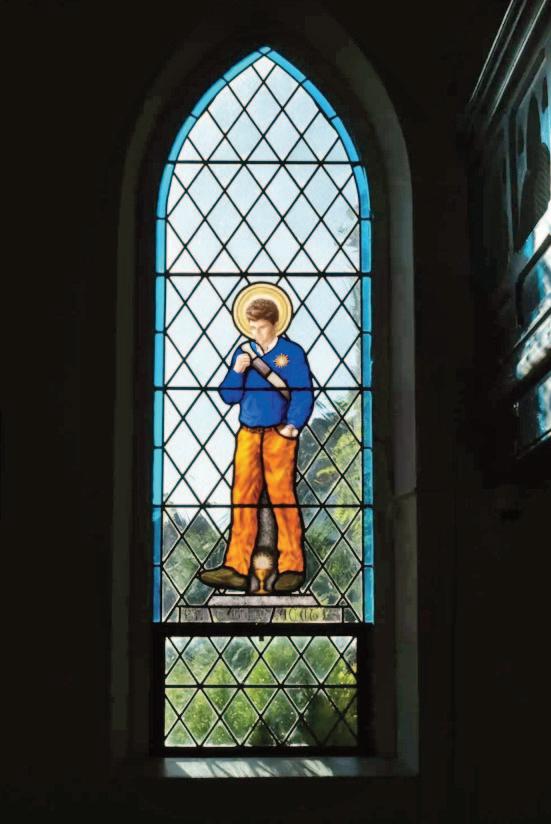
leave their prayers and petitions, as well as responses to answered prayers.
We have composed three sets of prayers for the intercession of Blessed Carlo. The first prayer is designed for children aged 1-13 years, the second for youth aged 14-20 years, and the third for adults. Each prayer is tailored to resonate deeply with its intended age group, ensuring that everyone, from the littlest believers to the wisest among us, can seek Blessed Carlo’s guidance in a way that speaks to their hearts.
Over the past three years, our efforts have been focused on the project of constructing a parish hall. This endeavour is crucial because our parish has never had a dedicated space for catechesis, children’s education, and social gatherings. As we strive towards this goal,
having already raised nearly half of the required funds, we are filled with hope.
The recent influx of visitors, especially young people and children drawn to Blessed Carlo, the young saint, highlights the urgent need for such a facility. This hall will serve as more than just a physical structure; it will be a place where our youth can gather, deepen their understanding of Blessed Carlo’s life and teachings, and grow spiritually. It will empower them to embody holiness and spread the light of faith wherever they go.
To learn more about our parish and this project, we invite you to explore our website: https://www.saintaldhelms.com/new-parishhall-project
Fr Thomas Kulandaisamy, JCD Parish Priest of St Aldhelm’s- Malmesbury cliftondiocese.com
“We are very grateful to the Diocese Fundraising team for their work on our behalf to secure the grant and we are delighted with the outcome.”
Sometimes even the most modest of funding can make the world of difference. This month, Becky’s Café, at the Immaculate Conception and St Joseph’s parish in Christchurch has been awarded a £845 grant from the Dorset Community Foundation (Grants for Groups –Dorset Community Foundation) to allow it to continue providing company, friendship, support and a warm and inviting community facility where people can meet, relax and enjoy fresh home-cooked food.
The Café, which is open every Thursday, has been running for two years and is wellestablished in the neighbourhood, offering home-made soup, sandwiches and cake with hot drinks, as well social activities and a chance to get together with others, in a warm space, to help combat loneliness and isolation.
The Café is named after Becky Jordan, a muchloved young parishioner, who always said that ‘things are always better with friends, tea and cake around us’.
The Café won a similar grant from the DCF the previous year and once again the money will be used to fund the supplies it needs, supplemented by the generosity of donations by volunteers and customers.
“We have built a wonderful team who make the food, serve and welcome everyone,” explains Rosie Proctor, who manages the café with her husband Brian and a group of around
20 volunteers. “The fact we are open all year has been particularly welcomed by all our guests and is a wonderful foundation on which to build next winter’s provision.”
Around thirty people from many different backgrounds visit the Café each week; some come because they are hungry, others because they are lonely, some are carers needing some care and respite themselves. Several of the café’s regulars come with or to meet others they know through the Cafe.
“Younger families visit the church site to access help and advice at the Christchurch Food Bank, which is housed onsite in the old chapel and have told us how much it means to them, whether they come once or are regular patrons,” says Rosie. “We work with the Food Bank and Christchurch Community Partnership as well as local schools and the medical centre to enrich the quality of life to all those we can reach.
She added: “We are very grateful to the Diocese Fundraising team for their work on our behalf to secure the grant and we are delighted with the outcome.”
If you would like to support the vital lifeline that the Café provides to the local community and help to ensure that Becky’s legacy continues to live on, please get in touch by contacting: fundraising@portsmouthdiocese.org.uk
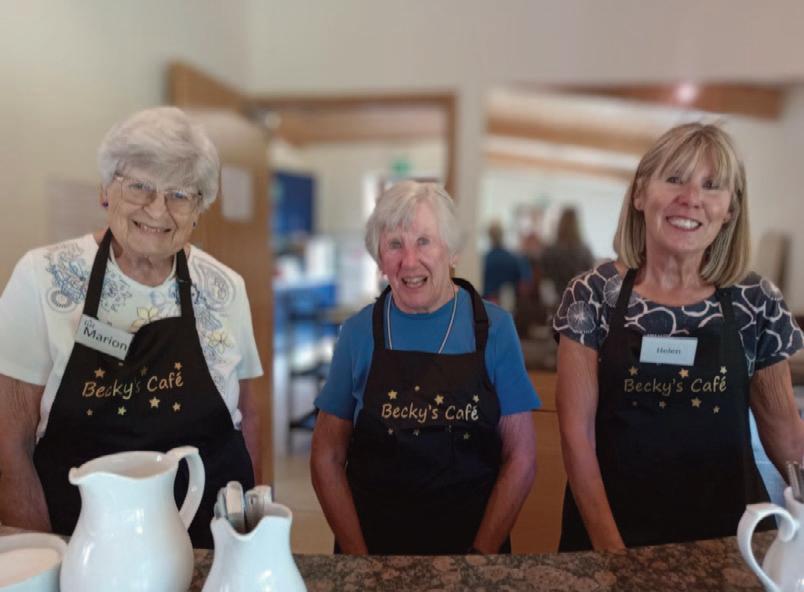
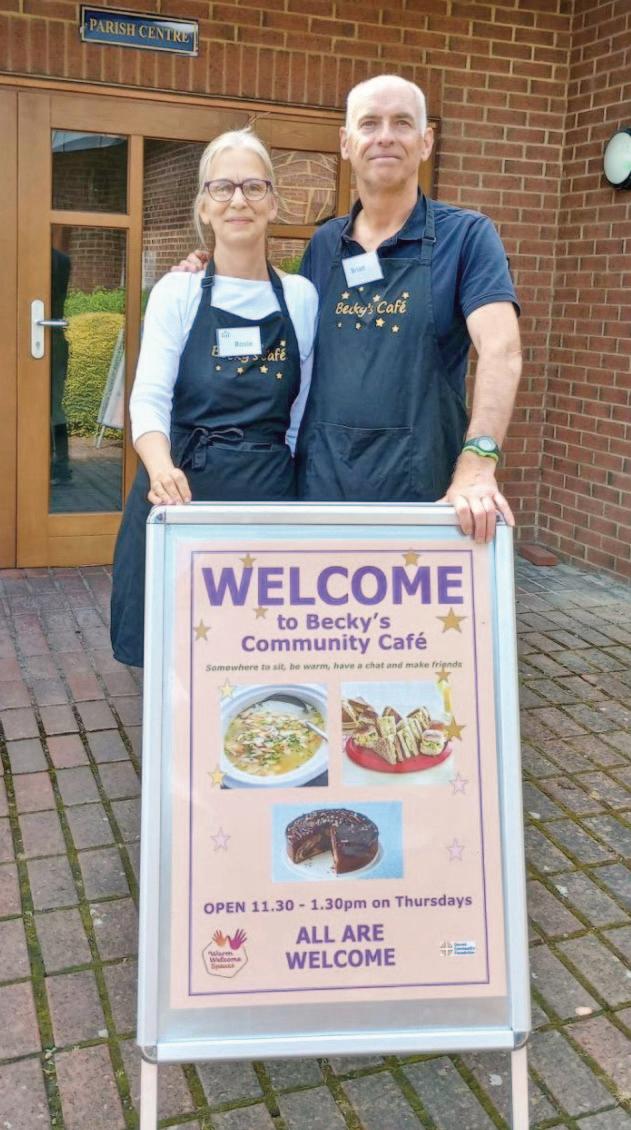
September 26th
St Cosmas and St Damian were brothers, born in Arabia, who had become eminent for their skill in the science of medicine. Being Christians, they were filled with the spirit of charity and never took money for their services. At Egaea in Cilicia, where they lived, they enjoyed the highest esteem of the people. When the persecution under Diocletian broke out, their very prominence rendered them marked objects of persecution. Being apprehended by order of Lysias, governor of Cilicia, they underwent various torments about the year 283. Their feast day is September 26th.
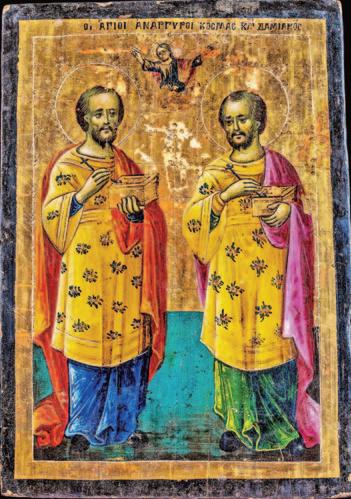
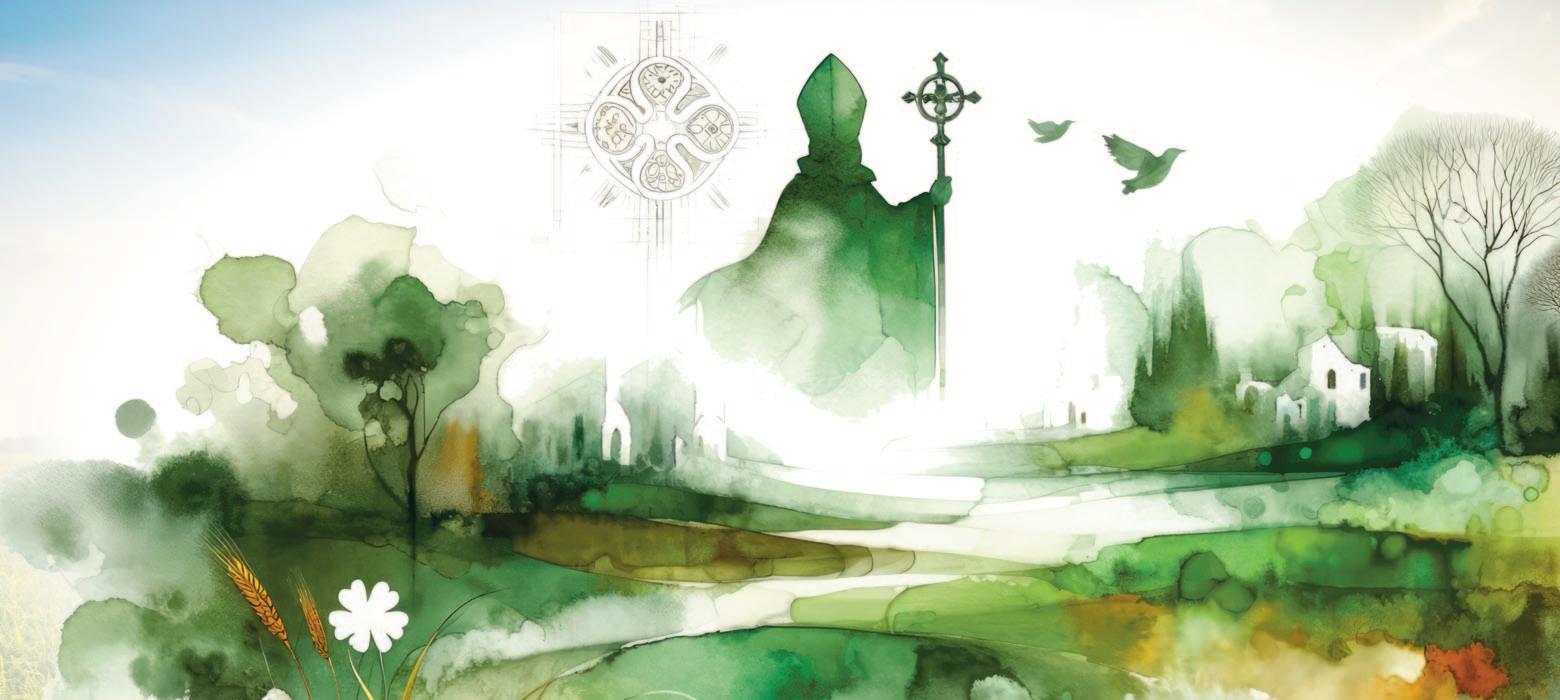
Rt Rev Dr David Oakley
Let’s go back to the beginning and the nine year old, wanting to discover more about his faith.
As a nine year old boy, growing up in south Birmingham, it was a real blessing to belong to a vibrant and dynamic parish community. And about this time, the idea of a priestly vocation began to frame my understanding of what life might look like. It was certainly not all plain sailing! During my teenage years, it took much soul-searching before the final deal was done. At one point, the thought of joining an overseas missionary society was very strong. That was until one of the parish assistant priests pushed back a little. Why are you thinking of being a missionary elsewhere? There is enough mission work to be getting on with here in Birmingham!
Let’s go back to the beginning and the nine year old, wanting to discover more about his faith. In those days, we used to have catechism classes in my primary school. We had to learn the questions and answers of the Catechism of Christian Doctrine as it was formally known. The second question was, Why did God make you? And the answer was, God made me to know him, love him and serve him in this world and to be happy with him for ever in the next. The final bit was definitely something to look forward to. The challenge was to make sure one got the first part right. All that getting to know God, loving and serving him (and presumably one’s neighbour as well), well that could be somewhat challenging.
These days, and with the guidance of the popes since St Pope Paul VI, we have a clearer
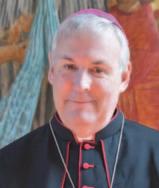
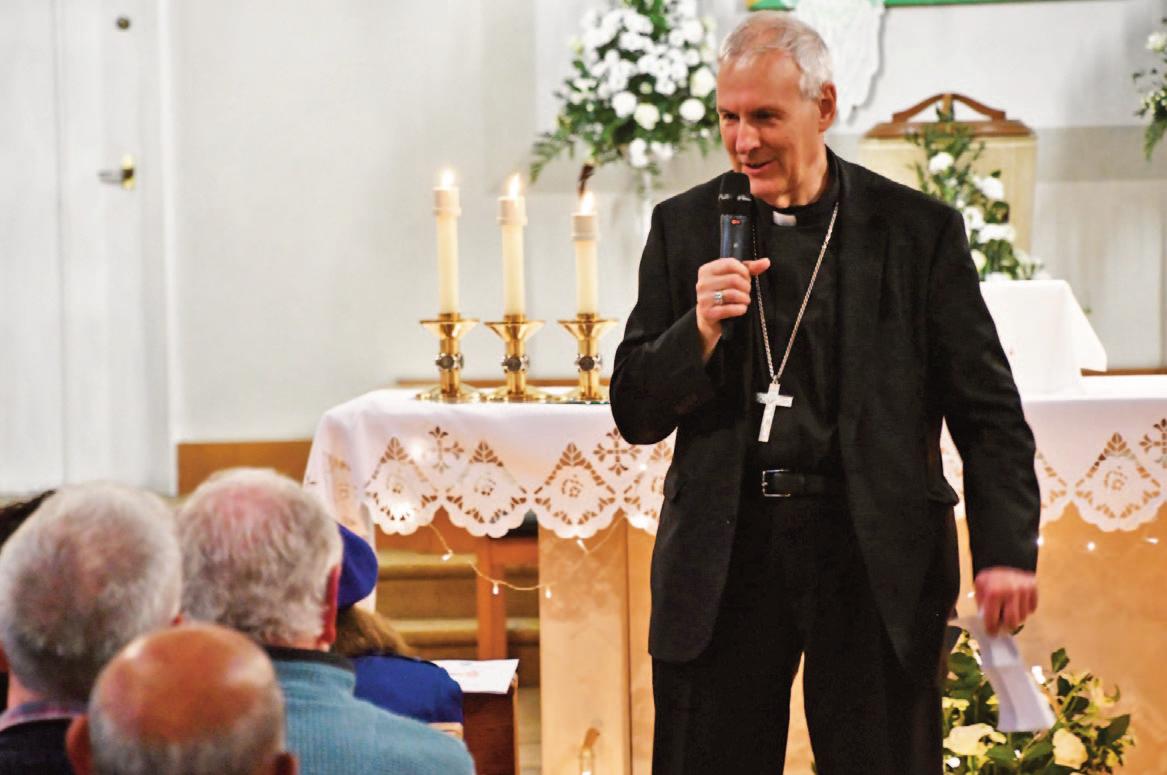
understanding of what this might all look like. It’s about becoming a missionary disciple. So back to the penny catechism for a moment. There is a question there, What is Baptism? And the answer, Baptism is a Sacrament which cleanses us from original sin, makes us Christians, children of God, and members of the Church. Of course, there is nothing wrong with this answer. That said, the more recently published Catechism of the Catholic Church, which some of you may be familiar with, presents a fuller appreciation of things. Baptism means being immersed. Through baptism, we are immersed into the life and love of the Trinity God. The Catechism of the Catholic Church speaks of Baptism in beautiful
terms. It is the ‘gateway to life in the Spirit’. We are ‘reborn as sons of God.’ And so we are ‘incorporated into the Church and made sharers in her mission’. And to complete the picture, Confirmation is ‘the completion of baptismal grace.’ Enriched by a special strength of the Holy Spirit, we are made ‘true witnesses of Christ, more strictly obliged to spread and defend the faith by word and deed.’
The more recent Catechism suggests that through sacramental initiation, being a missionary disciple is part of our ecclesial DNA as it were. It defines who we are. We might disagree about so many things. We may want to emphasise different things. Indeed, we may
wish to live out our baptismal calling in a variety of different ways. At the heart of it all, is this truth, every baptised member of the Church is made a sharer in the missionary activity of the Catholic Church. And so it is a great joy for me, to have the opportunity to explore this with you these Catholic Post articles, and to play some small part in helping others to open their eyes to what it means to be a missionary disciple.
Bishop David is the Bishop of Northampton and is Chair of the Bishops Conference Department for Evangelisation and Discipleship
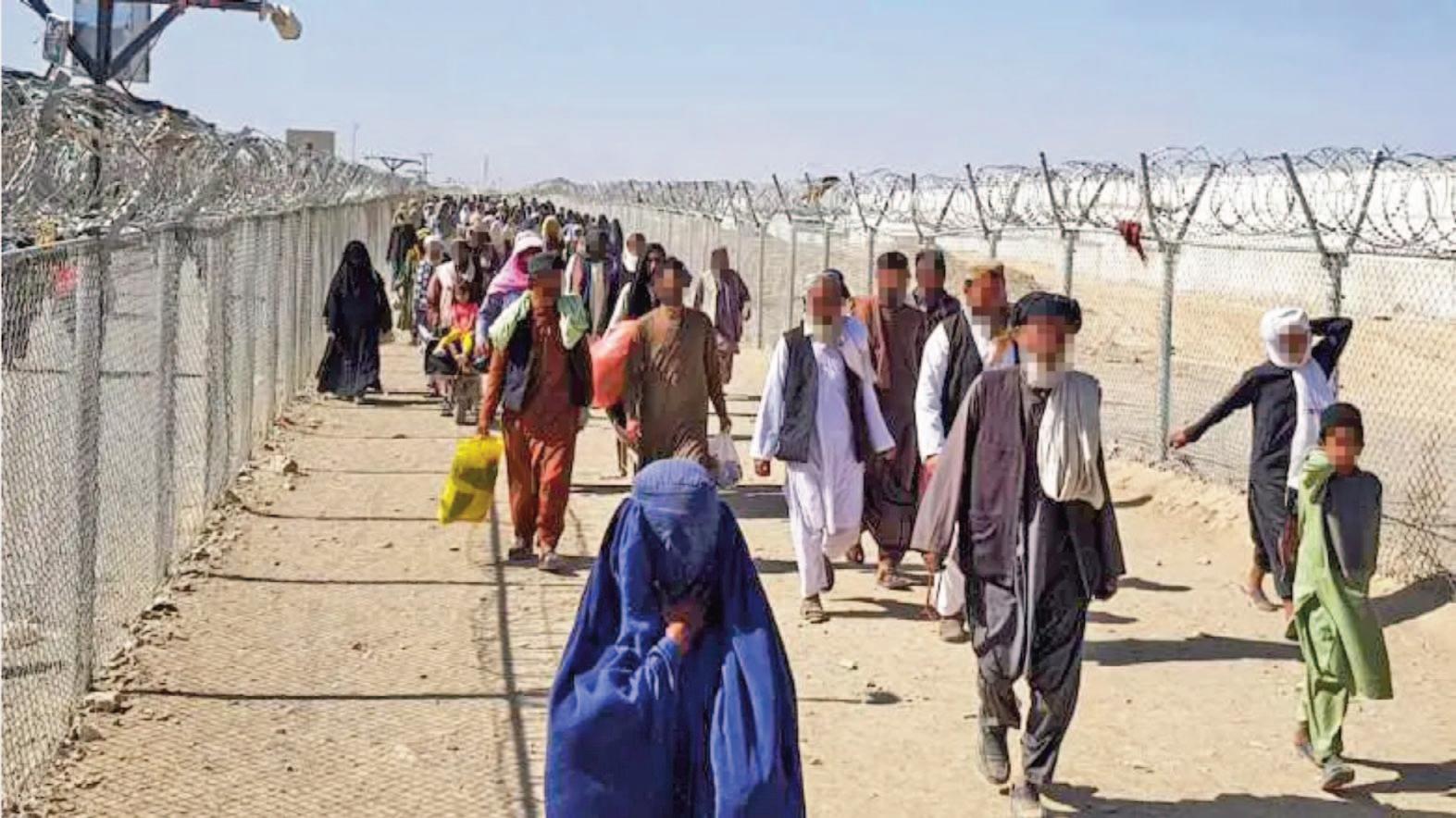
“The ongoing humanitarian crisis requires urgent attention, and the Afghan people need more than just words of solidarity - they need concrete action."
As Afghanistan marks three years since the Taliban's return to power, the country continues to grapple with profound challenges. An estimated 23.7 million people are currently in need of assistance in Afghanistan, in a population of around 40 million. However, CAFOD remains steadfast in its commitment to support the people of Afghanistan as they face these complex challenges.
CAFOD works with local Afghan organisations, who have become beacons of hope amid ongoing crisis, working tirelessly to restore dignity and opportunity to communities. Despite facing severe restrictions and a deteriorating political landscape, these organisations have focused on empowering small farmers, promoting women's entrepreneurship, and addressing climate change impacts through initiatives like tree-planting and flood defences.
Grace How, CAFOD's Country Representative for Afghanistan, emphasises the importance of continued international engagement: "The world cannot afford to turn its back on Afghanistan. Our commitment to the Afghan people has not wavered, and we stand with
those who continue to fight for their rights and dignity. The resilience we witness every day in Afghanistan is a testament to the human spirit, and we are determined to support it, no matter the challenges."
"As the international community reflects on the third anniversary of the Taliban's resurgence, CAFOD calls for renewed global efforts to support Afghanistan. The ongoing humanitarian crisis requires urgent attention, and the Afghan people need more than just words of solidarity - they need concrete action."
Since the late 1980s, CAFOD has been active in Afghanistan, focusing on supporting local Afghan organisations dedicated to improving the lives of vulnerable and marginalised people, helping them to earn a living. The charity is currently running an emergency appeal to continue to provide this life saving work.
For more information, please visit: www.cafod.org.uk/afghanistan

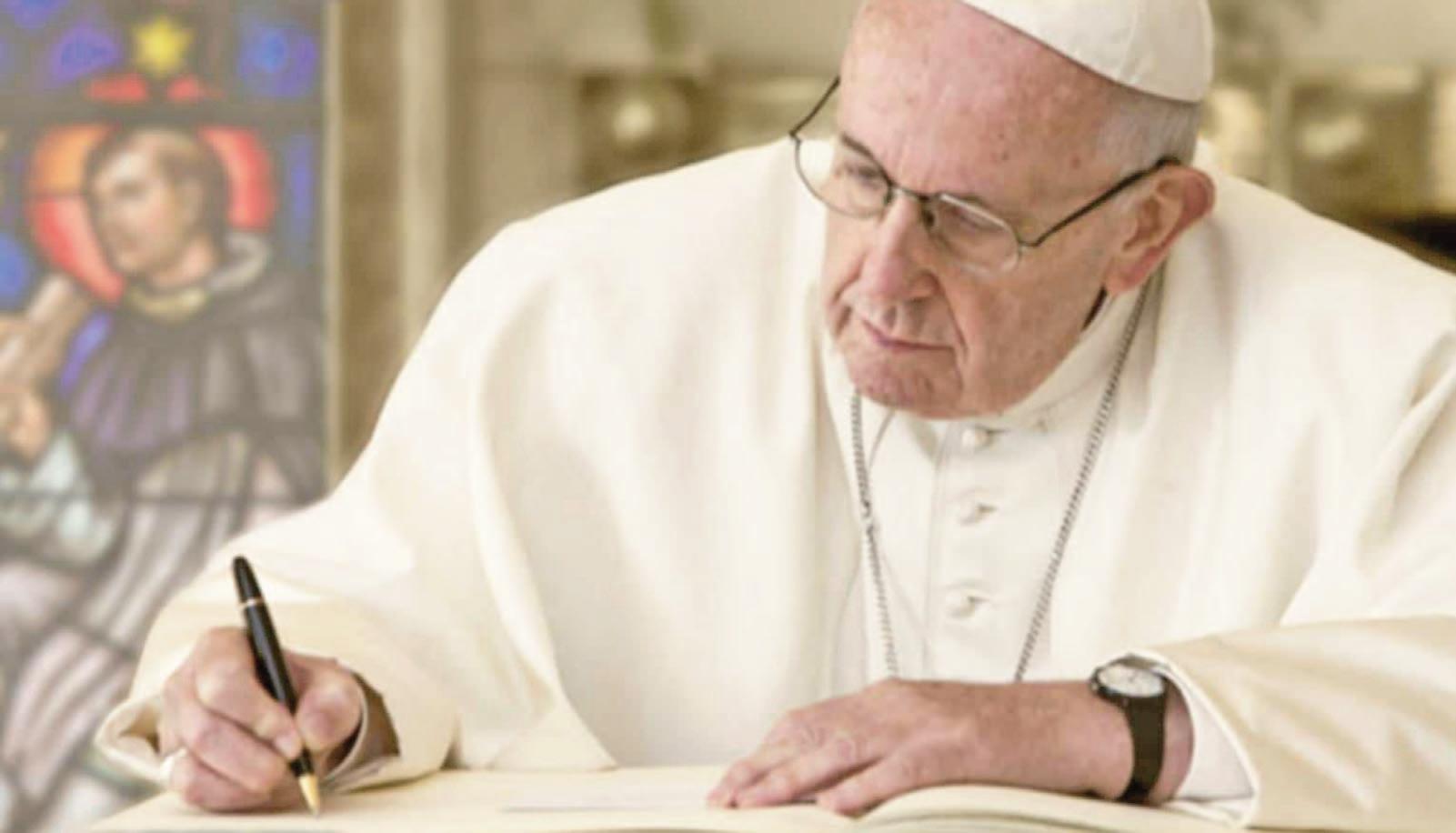
A good book opens the mind, stimulates the heart and prepares us for life
Pope Francis addresses a letter to candidates for the priesthood, but also to pastoral workers and all Christians, to underscore the “value of reading novels and poems as part of one’s path to personal maturity,” because books open up new inner spaces and help to face life and understand others.
A good book opens the mind, stimulates the heart, and prepares us for life, Pope Francis writes in a letter to future priests, but also all pastoral workers and Christians will appreciate "reading novels and poems as part of one’s path to personal maturity."
With his letter on the role of literature in formation, written on 17 July and published Sunday, 4 August, Pope Francis aims to encourage "a renewed love for reading" and above all "to propose a radical change of course" in the preparation of candidates for the priesthood, so that more space is given to reading literary works. Because literature can educate "the hearts and minds of pastors" to "the free and humble exercise of our use of reason" and to "a fruitful recognition of the variety of human languages," thus broadening
human sensitivity and leading to greater spiritual openness.
Moreover, the task of believers, and of priests in particular, is to touch the hearts of contemporary people so that they may be moved and open before the proclamation of the Lord Jesus, and in all this "the contribution that literature and poetry can offer is of incomparable value."
Beneficial effects of reading
In his letter Pope Francis first emphasises the beneficial effects of a good book that can "provide an oasis that keeps us from other choices that are less wholesome," and when "in moments of weariness, anger, disappointment or failure, when prayer itself does not help us find inner serenity," can help us get through difficult moments and "find peace of mind".
People used to dedicate themselves to reading more often "before our present unremitting exposure to social media, mobile phones and other devices", observes the Pope, who points out that in an audiovisual product, although
more complete, "the time allowed for ‘enriching’ the narrative or exploring its significance is usually quite restricted", while reading a book the reader is much more active. A literary work is “a living and ever fruitful text.”
It happens, in fact, that in reading, the reader is enriched by what is received from the author, and this enables him to make the richness of his own person flourish.
While it is positive that "some seminaries have reacted to the obsession with ‘screens’ and with toxic, superficial and violent fake news, by devoting time and attention to literature,” to reading and discussing books, new or old, that have much to say, Pope Francis acknowledges that in general those in formation for ordained ministry may not have enough time to dedicate to literature, sometimes considered "a ‘minor art’ that need not belong to the education of future priests and their preparation for pastoral ministry."
"Such an approach is unhealthy", says the Pope, and can lead to "serious intellectual and spiritual impoverishment of future priests", who thus do not have privileged access which literature grants to the very heart of human culture and, more specifically, to the heart of every individual". Because, in practice, literature
has to do with what each of us desires from life, he writes, and it enters into an intimate relationship with our concrete existence and all its tensions, desires and meanings.
In order to "respond adequately to many people’s thirst for God, lest they try to satisfy it with alienating solutions or with a disembodied Jesus", believers and priests, in proclaiming the Gospel, must endevour so that "everyone be able to encounter Jesus Christ made flesh, made man, made history." One must never lose sight of the “flesh” of Jesus Christ, the Pope recommends, "that flesh made of passions, emotions and feelings, words that challenge and console, hands that touch and heal, looks that liberate and encourage, flesh made of hospitality, forgiveness, indignation, courage, fearlessness; in a word, love".
For this reason, Pope Francis underscores that "familiarity with literature can make future priests and all pastoral workers all the more sensitive to the full humanity of the Lord Jesus, in which his divinity is wholly present".
The full text of the Letter of Pope Francis on the role of literature in formation can be found at www.vatican.va
By Tiziana Campisi
“We do not have a crisis of good people… All of us are capable of building relational power to bring about change.”
“Politics creates the world we see around us and can shape our society towards more, or less, Christ-like ends.” The Rt Revd Dr Guli Francis-Dehqani, the Anglican Bishop of Chelmsford and member of the House of Lords, spoke these words during her keynote address at the National Justice and Peace Network (NJPN) Annual Conference at the Hayes Conference Centre in Derbyshire last weekend.
The event took ‘Just Politics’ as its title. Bishop Guli’s experiences and insights resonated with the 160-strong audience, many of whom are actively engaged in justice, peace, advocacy and social action, inspired by personal faith and by the principles of Catholic Social Teaching.
Participants travelled from many dioceses across England, Wales and Scotland – bringing with them a wealth of experience of local, national and international action and concern. Religious orders were also represented. The wide range of age groups was also notable.
Sir John Battle, former MP for Leeds West and a patron of NJPN, chaired a full timetable of activities at the 46th annual conference. He said at the start that the weekend was “about active, practical hope,” coming so soon after the General Election and with the theme, ‘Just Politics’. He stressed that Catholic Social Teaching inspired vision and social action by Catholics.
Further talks and presentations were given by Dr Molly Scott Cato, Professor Emerita of Green Economics and a former member of the European parliament, and Steve Whiting, a peace activist in the Quaker tradition. Molly called for more citizenship education, Citizens
Assemblies, and engaging with the democratic process. Steve underlined the importance of political lobbying on justice and peace issues. Many of these issues were highlighted on stalls in a ‘Just Fair’ which included Palestinian goods and Fairtrade chocolate. The work of the Columbans, SVP, Pax Christi, CAFOD, Christian CND, Operation Noah, and many more were showcased.
Eight young adults led ‘Perspectives from Emerging Leaders,’ a question-and-answer session which received a standing ovation in recognition of the quality of their input. It was chaired by Michael Chambers of Million Minutes, who reported on its research findings that only 47 percent of young people felt the Church cared ‘a lot’ about social justice. The panel valued regular participation in the annual NJPN conference, which addresses issues of concern to them, particularly Conflict, Wellbeing, Equality, Racism and Discrimination. Intolerant language towards refugees by politicians was singled out for criticism and also sexism in churches, such as the use of non-inclusive language.
From the Diocese of Hexham & Newcastle, Fr Chris Hughes brought a team to share the innovative work of Tyne & Wear Citizens which he co-chairs. The words of Sara Bryson, an Assistant Director at Citizens UK, resonated strongly with everyone when she said: “We do not have a crisis of good people… All of us are capable of building relational power to bring about change.” Together with Citizens UK, schools, community groups and other faith communities, Tyne & Wear Citizens has achieved significant local change. Through community-organising models, they have
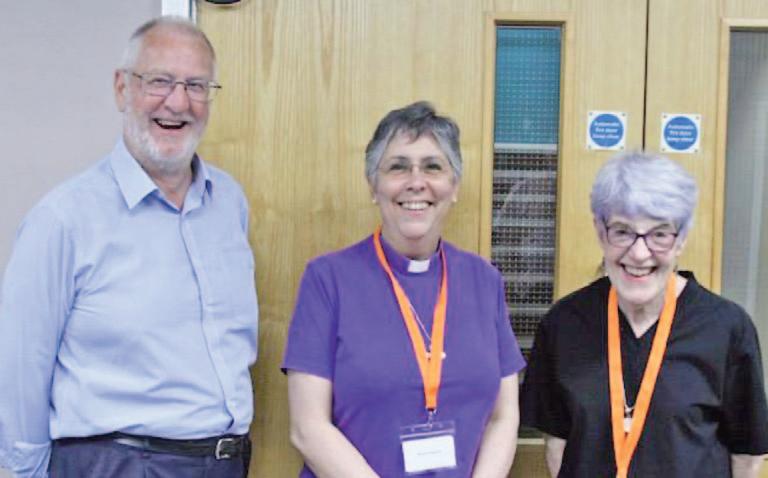
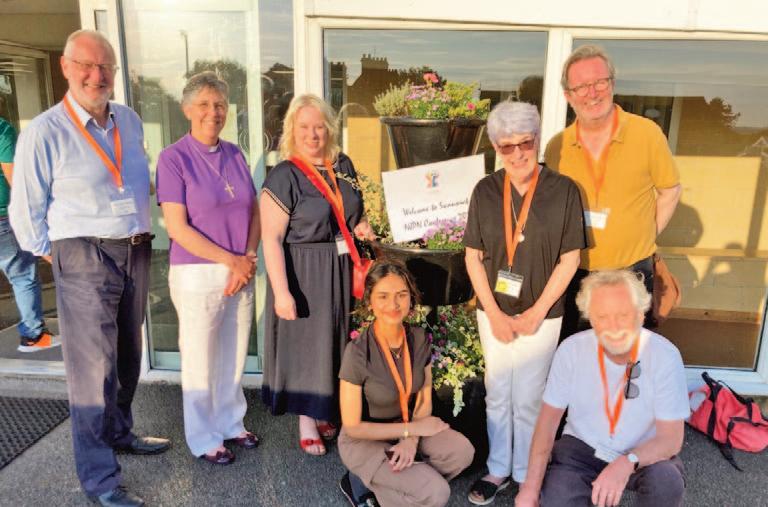
addressed living wage provision, mental health support and the free school meals systems. Catholic medical student Shantel Suneesh recounted her campaign on equitable bus fares for young adults in education across the North east – a transformation which now positively affects 23,000 young people. In the discussions and plenary that followed, eleven diocesan contacts promised to push for their dioceses to make a commitment to the Living Wages. Birmingham would look into Citizens UK work in their diocese. Several dioceses fed back they would be lobbying against the twochild cap on benefits, which has pushed many families into poverty. Pax Christi England and Wales expressed interest in community organising techniques for planning its Autumn campaigning against arms fairs.
High-quality workshops gave delegates an opportunity to update their understanding of issues like UN Sustainable Development Goals, nonviolence, and neoliberalism. Among them was a CAFOD/SVP one introducing their ‘Year of Encounter’ programme, following up on their successful mobilising of the Catholic voice in the General Election in more than 300 parishes and 200 constituencies; 123 parishes organised hustings. Another workshop was led by the Caritas Social Action Network (CSAN), promoting its ‘Do Justice’ campaign and
encouraging ongoing political engagement. These two workshops involved J&P activists from ten dioceses and four religious orders.
The gathering was further enriched by thoughtful liturgies prepared and animated by members of the Lay Community of St Benedict, church musicians and singers drawn from many parts of the country – and indeed other countries. Members of the Lay Community provided a separate but linked programme for children and young people.
A project called ‘The Passion for Change’ provided an exhibition of sculpture and poetry and an opportunity for creative engagement with the conference themes.
Mass was celebrated by Fr Dominic Robinson SJ, Chair of Westminster Diocese Justice and Peace Commission. He urged the congregation “to pass on a message of great hope, proclaiming a Kingdom of Justice and Peace. Bidding prayers called for “just and caring politics” and for J&P campaigners “to model a better way of living and being in our communities so that we can be an inspiration for a just politics.”
Recordings of the main talks will be available on the NJPN website www.justice-andpeace.org.uk
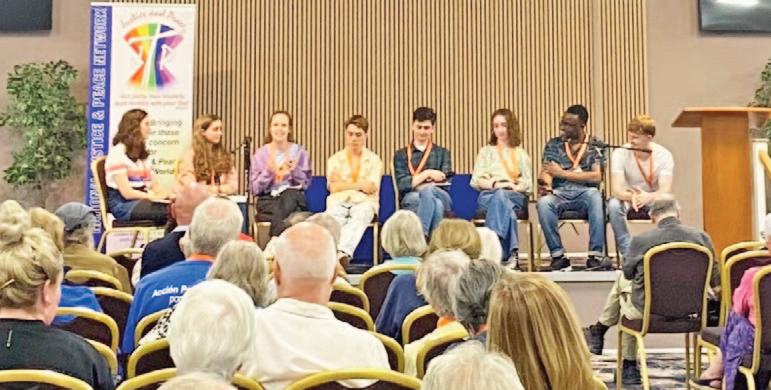
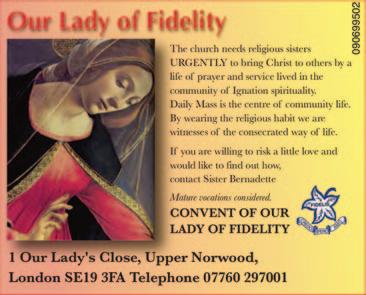




Dr Jay Kettle-Williams
Cross-culturalism, multiculturalism, pluriculturalism or, for those of less Latin but more Greek persuasion, polyculturalism are among terms bandied back and forth these days. They are like Greek sirens taunting society. The terms underscore the defiantly variant natures at loggerheads with each other, gnawing at the fabric of our society. Diversity, individuality, the consuming selfrespect over and above that for others hold pole position, vying against the common good. We see a fragile craft increasingly out of kilter in an increasingly restless sea.
It’s such terms as catholicity - referring to the inclusion of all - and Catholicity - the universality of the Catholic faith - which offer the opportunity to bind us all as one family striving together for shared goals. Therein lie core issues of Christian ethos such as diversity, equity and inclusion (DEI) which we see embodied in the five main British values of democracy, the rule of law, individual liberty, mutual respect and tolerance of those of different faiths and beliefs.

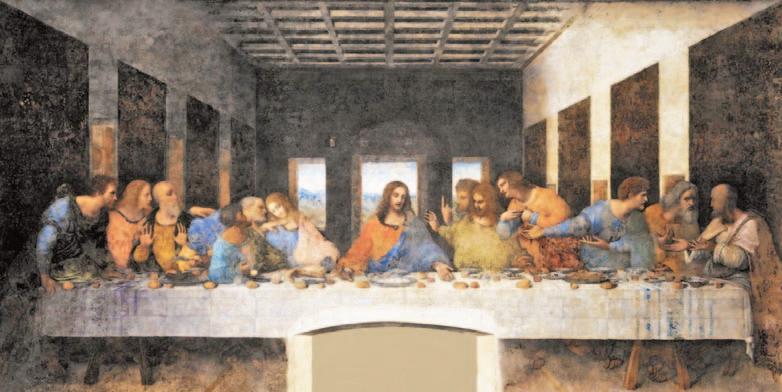
opportunity to enjoy, although perhaps not to celebrate, all Holy Days in the Christian calendar.
seeing images like those now parading on the screen before me. I checked the bottle from which I was drinking. Good ole Chilean red. Nothing wrong there.








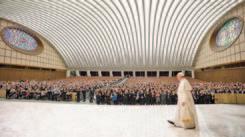


So it was that I sat down one evening in July in front of the box – I admit with glass in hand –to enjoy the opening ceremony of The Olympics, Paris 2024, looking forward thereafter to witnessing the efforts of the world’s leading athletes in pushing forward their abilities.
The nine years of preparation by France in the run-up to Paris 2024 had taken the previous opening ceremony of the 2012 Olympics, hosted by the UK, as the benchmark. Not that anyone expected President Macron to be effecting any form of Elizabethan skydive! It was indeed a pity that that highly heralded outdoor event was marred by inclement weather. But that was a risk the French had taken, nobody really expecting such inclement weather in July.
Attention had long been focussed on the Olympics opening ceremony artistic director, Thomas Jolly (b. 1982, Rouen) and to how the opening ceremony would play out. Jolly had envisioned an inclusive celebration along the Seine river based on 12 tableaux. Jolly’s grandfather had taught catechism to children but Jolly himself never received a religious education.

France, as we know, is a secular country. Be that as it may, that fact does not deter the whole French nation from taking any
Imagery employed under Jolly’s direction at the opening ceremony has enraged many for its apparent parody of the mural ‘The Last Supper’ (see inset) by the Italian High Renaissance artist Leonardo de Vinci (c. 14951498). In the face of criticism from around the world and death threats on social media, Jolly has denied it was ever his intention to cause offence or show disrespect. However, a member of the troupe appears to have contradicted Jolly on this point by saying that the intention was to launch ‘The New Gay Testament’, albeit in defiance of the Aristotelian classic 3-part theory on persuasion calling for Logos (Logic and consistency of an argument), Pathos (Connection with people’s values and beliefs) and Ethos (One’s credibility and standing to persuade).
The opening ceremony for Paris 2024 had been based around a procession of small boats moving downstream on the Seine carrying the numerous teams of athletes. Those athletes had been waiting patiently in their thousands for the ceremony to get fully under way. A variety of sideshows were enacted along the river’s bank and at various other venues. I admit to being a bit confused.
Market research tells us that 80% plus of adult spectators and viewers had been impressed and that they had duly applauded the spectacle. I admit to siding with the minority on that count, although the final moments with the illuminated image of the horseman who came riding down the river in the style of Noyes was truly an artistic wonder.
I remember being in hospital some years ago, recovering from a major operation. They’d put me on morphine. I was hallucinating wildly
However, Mr Jolly’s image which has caused a bit of a stir was that of a meal, a supper with a number of personages facing me from behind a long table. The Olympics, born of practices long before the advent of Christianity, had turned to ridicule the Christian basis on which Western culture was based. No doubt, by the time you read this, many bishops - other than those predominantly from the USA – will have also given voice to their indignation.
As a young lady from Syria recently commented: ‘I’m a Muslim. I’m sick of this. Why aren’t Christians doing anything? Why are you weak?’
However, as Christians, we turn the other cheek, we take the hit. And what could be a more defiant gesture of strength than to turn the other cheek? But, on the other hand, as Evangelists, ours at such a point as this is not to fall silent, or to move lamely to one side but somehow to bounce back off the ropes.
Acknowledgements and Attribution: Texts/References adapted and/or adopted from http://en.wikipedia.org under the terms of the Creative Commons AttributionShareAlike License 4.0: http://creativecommons.org/licenses/bysa/4.0/;’The Last Supper’ by courtesy of Pixabay.

That night began what has now become four months of imprisonment for Layan-and day after day of anxiety and grief coupled with sheer determination from her mother
Lulu Aranki-Nasir can't tell the story without crying and recalling lots of pain-but she wants the world to know.
On 7 April, in the darkness at four in the morning, armed vehicles pulled up to her home, where she, her husband, and her daughter, Layan, were sleeping in their home in the town of Birzeit in the West Bank.
Israeli soldiers were banging on the door. "We woke up," said Lulu. "My daughter was calling for me."
That night began what has now become four months of imprisonment for Layan-and day after day of anxiety and grief coupled with sheer determination from her mother.
Looking back, Lulu is thankful, that her sons were not there that night. "Fortunately, my sons were not home because my eldest son is a doctor, and my younger son, Layan's twin brother, was traveling to Istanbul for a vacation," she said. "If they were at home, the soldiers would have treated them very badly."
When Lulu opened the door, the soldiers entered the house. "I started asking them: what do you want from me?" Lulu said. "A soldier told me 'Don't talk or we will shoot you' and he put the gun on my face."
Other soldiers went through the house. "Everywhere, they searched," said Lulu. "Then they asked us to put our hands on the wall."
Layan's parents were also told not to move or talk. So they didn't.
"We didn't want to make trouble for us or our daughter," said Lulu. "Then the captain told us he was taking Layan with him." The soldiers showed no arrest warrant for Layan and no warrant to search the home.
Layan, who was sitting in her room, asked to change from her pyjamas into her clothes. "He brought a woman soldier who stayed with Layan when she was putting her clothes on," said Lulu. "Then he blindfolded her and handcuffed her."
As Lulu recalls watching her helpless daughter taken away, she breaks down when she tries to
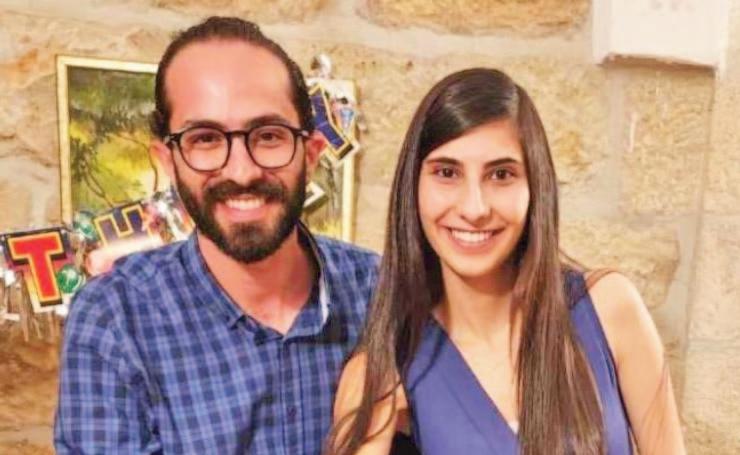
describe how she felt. "She was very weak at that moment," said Lulu, who wept at the memory.
From that moment on, Layan has been held in what is defined as "administrative detention" without any charges. "They blame that she is a danger for the security of the Israeli state," said Lulu. "How come this young lady is a danger to the Israeli state?"
A deafening silence
The lack of communication with her daughter hangs like a weight on Lulu's shoulders. In four months, she has been allowed to talk to Layan two times.
"The lawyer tries to ask for a visit," said Lulu. "He is not allowed to stay for more than 15-20 minutes." The meetings are conducted in the presence of Israeli security officers, which violates basic principles of due process of the law and human rights.
Leaders from Layan's Anglican church have also been denied visits. Layan's parents have shared her story with World Council of Churches (WCC) moderator Bishop Dr Heinrich Bedford-Strohm and WCC general secretary Rev Prof Dr Jerry Pillay, who called for the immediate release of Layan and other unjustly detained Palestinians.
Meanwhile, Lulu worries about Layan's health in prison.
"Inside the prison, the quantity of food is a very small portion for each prisoner," said Lulu. "My strong call to the churches is not only to press to bring my daughter home but also to press their governments to make the prison situation better," she said. "The prisoners are suffering. There is no food."
She has also received some good news: "We have heard Layan gives a very positive energy to all the prisoners," said Lulu. "One of the prisoners is very sick and Layan helps her."
In her own mind, Lulu is imprisoned in a home without her daughter's presence. "I cannot enter her room because I am too sad," she said.
"My eldest son got a chance to go to USA to specialize in internal medicine in Atlanta."
Layan's older brother had to leave without saying goodbye to his sister. Her twin brother, who used to commute to work with her, sharing a car, now goes alone each day. Layan, a university graduate with a degree in nutrition and a minor in business administration, worked in a women's development non-governmental organization before she was detained.
How many more days?
Lulu is asking the world to pray for her strength and courage as she counts the days that her daughter has been gone. "I'm not sure she will be out in December," she said. "They may renew her staying in prison.
"She turned 24 on May 20-in prison-with no visits," said Lulu. Her twin brother didn't celebrate his birthday, either, out of solidarity with his sister.
When the profound emptiness threatens to overwhelm her, Lulu recalls joyful events of the past: birthday parties, Layan's games of basketball and soccer, and simple family dinners. "When I feel sad, I also pray," she said. "I pray to God to help me be strong. Layan has a strong personality-and she has a sweet heart. I have to have the courage for her."
Approximately 3,615 Palestinians are held in administrative detention, including 40 children and 20 women. A Palestinian can be arrested by Israel based on secret information, which cannot be accessed by the detainee or a lawyer; without trial; and without having committed an offence, on the grounds that he or she plans to break the law in the future. There is no legal limit on the overall time that a person can be held in administrative detention, so the detention can be extended over and over.



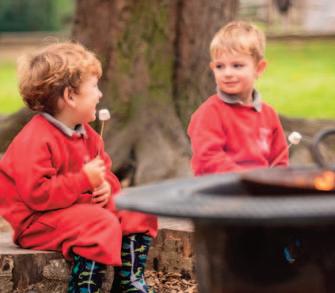



liverpoolcatholic.org.uk
“Somebody has said that it is better to light a single candle than curse the darkness.”
The Congregation of the Blessed Sacrament is hosting drop-in sessions on the second and fourth Tuesday of the month for anybody who wants to come in for a chat or a cup of tea.
The sessions, which are supported by Samaritans Liverpool and Merseyside, are open to anybody, regardless of their religious beliefs.
It is a new project that commenced in July 2024. It is taking place at the Blessed Sacrament Shrine Church, which is in Liverpool City Centre, just behind Williamson Square, by Queens Square Bus Station.
This forms part of the discernment to respond to the loneliness, isolation, and needs of people especially family carers.
Fr Darren Maslen, Superior at the Blessed Sacrament Shrine, preached about it in a recent homily before the launch of the project.
In the homily, he said: “The Blessed Sacrament Shrine has been on this site for 39 years and its doors are open every day.
“Because it is not a parish, there are no geographical boundaries relating to the people who come here. What I hear is that generally, the Shrine is a place where all kinds of people have found a spiritual home and some fulfilment of what they seek in life.
“However, since undertaking responsibility for the Shrine 25 months ago, I am struck how so many people who come here reflect the biggest social disease that impacts upon so many societies including ours: loneliness.
“Every week I hear of the same kinds of experiences in conversation, in the confessional, or on the telephone- loneliness; the isolation of family carers; carrying such hefty grief or suffering in family life, and that

nobody cares and there is nobody to talk tothis is what I hear all the time.
“For the last three months, we have formed a small hub of people from the Shrine who had been working together diligently to set up all details for this project. It is meeting every second and fourth Tuesday of the month from 2.15pm in our St. Joseph’s Hall.
“Working in collaboration with Rachel Howley, the development manager of Samaritans Liverpool and Merseyside, together with her trained volunteers, the project, Shrine Friends, is a creative way to offer a solution to that ever so repetitive statement: Nobody cares and there is nobody to talk to.
“It is certain that by launching Shrine Friends we can become a practical influence for good in the community of which we are part as a eucharistic family.
“Somebody has said that it is better to light a single candle than curse the darkness. This project is a single candle to join the other candles burning in the Shrine chapel.
“If Christianity could recapture once again the simplicity of the idea of service, that Christ gave us, it would restore once more the meaning of life, and the significance for others of the work we find ourselves doing every week at the Shrine.”
vaticannews.va
The documentary also features interviews with Indigenous community members, from youth to elders, and faith leaders.
A Catholic youth group in Nepal has released a short documentary film highlighting the cultural traditions of the Tamang community in Tipling, marking the 30th International Day of the World’s Indigenous Peoples.
Produced by members of the FA MULAN SIGNIS group in the International Movement of Catholic Students (IMCS), the film, titled "The Convergence of Indigenous Tamang Tradition and Catholic Faith in Tipling," offers a rare glimpse into how the Tamang people integrate their Indigenous customs with Catholic beliefs.
The documentary captures various Indigenous practices unique to the Tamang community, such as traditional hair-cutting rituals and salt inaugurations. These practices serve as a testament to their strong cultural identity, which has been preserved despite the community’s embrace of Catholicism.
The film explores how these ancient customs are harmoniously woven into the community’s Catholic faith.
“As Indigenous people, we are very much connected with nature and the ethos, cosmology, and philosophy. I think this is one of the reasons that the Tipling people are interested in Christianity and accept it,” Bishop Paul Simick, Apostolic Vicar of Nepal and the Titular Bishop of Maturba, said in the film.
The release of the documentary coincided with the 30th International Day of the World’s Indigenous Peoples, which is celebrated globally every August 9.
This year’s theme focused on “Protecting the Rights of Indigenous Peoples in Voluntary Isolation and Initial Contact.”
Established by the United Nations in 1994, the day commemorates the cultural heritage and contributions of Indigenous communities worldwide and seeks to raise awareness about the ongoing challenges they face.
#SIGNISFAMULAN is a project of SIGNIS, or the World Catholic Association for

Communication, an organisation recognised by the Vatican as an International Association of the Faithful with the mission to “help transform cultures in the light of the Gospel by promoting human dignity, justice, and reconciliation.”
LiCAS News
Scan the QR code to view the youtube channel

“There are non-violent means to resolving issues that we might not agree on in our society, so let’s use those methods to bring about the peace and healing we need at this moment.”
Bishop Paul McAleenan, Lead Bishop for Migrants and Refugees, has condemned the riots that have taken place across the UK, saying such violence threatens the values of our society:
I condemn the recent appalling violence, especially that directed at migrants and their places of residence,” said Bishop McAleenan. “They demonstrate a complete disregard of the values which underpin the civil life of our country.”
He went on to praise charities, faith groups and volunteers who work in the community to welcome migrants and refugees:
“Today, and always, we need to continue to pray, work and stand together for peace in our country. The actions of the few involved in violence stands in stark contrast to the work of charities, church groups and volunteers who tirelessly extend the hand of welcome to migrants in acts of solidarity. We hope and
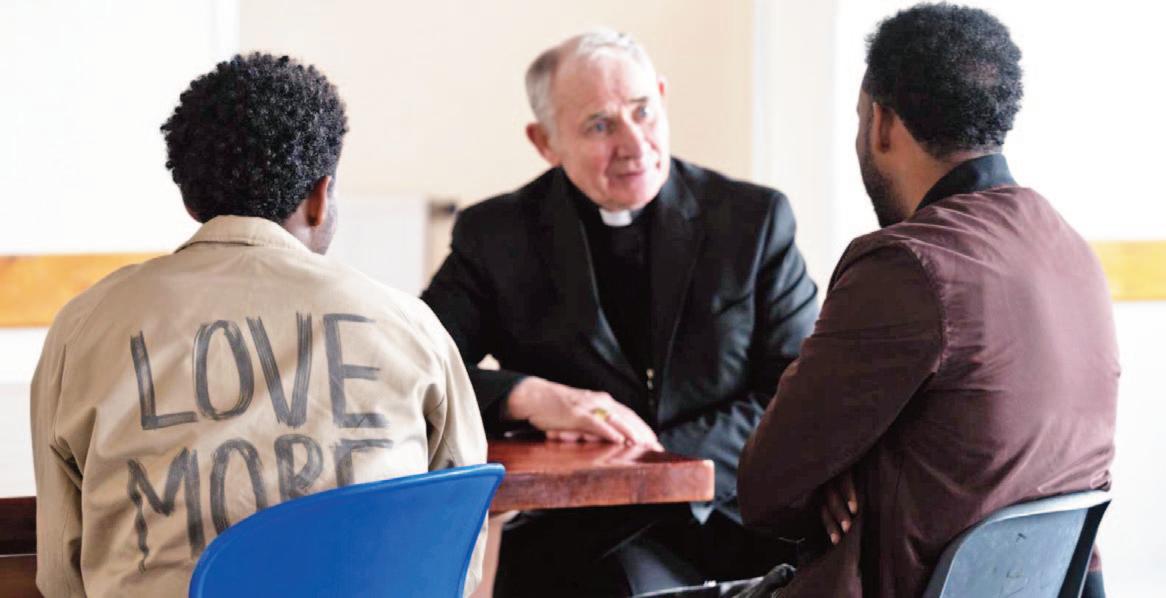
pray that they will re-double their efforts so that we can rebuild communities after these terrible events.”
Bishop McAleenan had a particular message for refugees and those working for the emergency services:
“My prayers are particularly with those who are sheltering in hotels or are feeling threatened. You are loved and welcome here. We all should do what we can to make sure that you feel safe. My prayers are also with the emergency services, who selflessly continue to work despite the risks. Thank you for all that you do in the service of the common good.”

This month's Home Office Prayer Vigil took place on Monday 19 August at 12.30pm, outside the Home Office building in Marsham Street, SW1.
As Home Office staff - whose job it is to decide the future of those who apply for asylum in this country - come in and out of
the building, participants will pray for them, for all migrants and refugees who tried or are trying to reach a place of safety in Europe and all those trying to help them.
There will be a shocking list read out of named and unnamed individuals and groups of people who have died in the last month, trying to make the dangerous sea crossing to Europe.
Like Bishop McAleenan, he too appealed for calm and an end to violence:
“There are non-violent means to resolving issues that we might not agree on in our society, so let’s use those methods to bring about the peace and healing we need at this moment.”

Fr Ed Broom
£3.95
CTS Product Code: D849
Please refer to this code when ordering over the phone
ISBN: 9781784697655 www.ctsbooks.org
Distraction can be a major hindrance to forming a habit of prayer and a deep prayer life. In this book, Fr Ed Broom offers practical advice on how to overcome distractions so we can speak to God with our whole heart and mind.
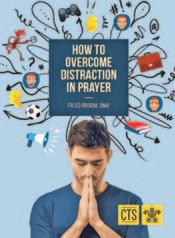
Prayer can be a struggle. Whether it’s because of busyness at work or school, the chores and clamour of family life, intrusive worries and anxieties, or ever-present digital distractions. Many of us struggle to form a habit of prayer. Fr Ed Broom is here to help Catholics learn to pray. In this book, he teaches us to recognise the causes of distraction in our lives and gives simple, practical advice on how to overcome them so we can speak to God with our whole heart and mind.
Fr Allen Morris
£3.95
CTS Product Code: LT15
Please refer to this code when ordering over the phone
ISBN: 9781784698195 www.ctsbooks.org
introduction of the new Lectionary in England, Scotland and Wales, this brief introduction to the Liturgical Ministry of Reader answers the most important questions for those who proclaim the Word of God to the faithful. Explaining how the Liturgy of the Word works and its place in the life of the Church this booklet includes guidelines for Ministers of the Word at Mass, leaders of Liturgy of the Word with Children and leaders of Divine Prayer and Lectio Divina.
COMPANION ITEM: The Word is Very Near to You, a workbook for the training and formation of Ministers of the Word.
Fr Allen Morris
£6.95
CTS Product Code: LT14
Please refer to this code when ordering over the phone
ISBN: 9781784698072 www.ctsbooks.org

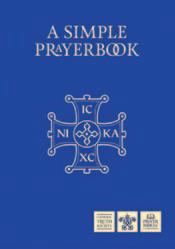
Featuring a large selection of Catholic prayers and devotions, A Simple Prayer Book includes everything you need to learn how to pray, from basic prayers such as the Hail Mary, to Morning and Evening Prayers, and prayers for various needs and occasions. Essential Catholic prayers such as the Stations of the Cross and the Divine Mercy Chaplet are also featured.
Additionally, A Simple Prayer Book will guide you in the Catholic faith, with explanations on Catholic teaching, as well as instructing how to pray the rosary, how to go to Confession and how to make a visit to the Blessed Sacrament. The Order of Mass is also included, alongside the Act of Spiritual Communion if you can't get to Mass, and prayers for before and after and Communion.
As CTS's bestselling Catholic prayer book, this handy booklet is the essential companion to prayer every Catholic needs
By Timothy J Buckley, C.Ss.R.
£4.95
Product Code: 1751
ISBN: 9780852314944 www.rpbooks.co.uk

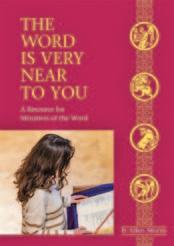
Designed to accompany the use of the newly-revised Ministering the Word of God in the training and formation of Ministers of the Word, this workbook is ideal for use in parishes, chaplaincies and schools, or any other setting in which the Word of God is a central part of ministry.
Designed to accompany the use of the newlyrevised Ministering the Word of God in the training and formation of Ministers of the Word, this workbook is ideal for use in parishes, chaplaincies and schools, or any other setting in which the Word of God is a central part of ministry.
By Richard Rohr £7.50
Product Code: 103572
ISBN: 9781473604018 www.rpbooks.co.uk
Join Freddie as he goes on a journey where he learns more about the sacraments. This collection of short stories is written for children aged seven to nine and explore many rites from the Catholic Church –looking back to the significance of their baptism and forward to their confirmation. Along the way Freddie also learns the true meaning of Easter and Christmas and begins to have a better understanding of prayer and the gifts of the Holy Spirit. For each chapter Fr Tim has written helpful guides for when to tell each story along with scripture references. Ideal for small groups of children but also great for children to read on their own. Freddie Freckles is a gentle way to teach them about the sacraments.

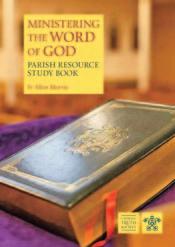
This brief introduction to the liturgical ministry of Reader explains how the Liturgy of the Word works and its place in the life of the Church as well as giving guidelines for Ministers of the Word at Mass and leaders of children’s liturgy and Lectio Divina.
For parishes wanting to help the faithful understand the changes to the Lectionary, we recommend Hearing Christ's Voice instead. Revised and expanded to mark the
Catholic Truth Society
£3.95
CTS Product Code: D665
Please refer to this code when ordering over the phone
ISBN: 9781860822599 www.ctsbooks.org
A Simple Prayer Book is the essential companion to prayer every Catholic needs, including the Order of Mass, a wide assortment of prayers, and simple explanations on key elements of the Catholic faith.
Richard Rohr focuses his attention on all frames and doorways to the divine – the alternative way of Francis of Assisi. Francis of Assisi, one of the most beloved of all saints, was at once very traditional and entirely revolutionary in the ways of holiness. A standing paradox, he stood barefoot on the earth yet touched the heavens; he was grounded in the Church yet instinctively moved toward the cosmos; he lived happily inside the visible and tangible, yet both suffered and rejoiced in the invisible. Rohr places the tradition as first practiced by Francis and subsequently by others, within a context for the uninitiated audience. This is not a historical accounting, but a perspective on how the alternative orthodoxy can deepen spiritual life for anyone. Eager to Love is grounded in the Gospels, the prophets, a broad blend of psychology and theology and in literature and art, to continue to communicate through all the sources that articulate specific alternative ways of understanding ways of understanding God with us.
By Aileen Urquhart
£7.95
Product Code: 1051
ISBN: 9780852313770
www.rpbooks.co.uk
I Belong is a programme that contains lively, colourful material in which illustrations and examples are used to reflect the world where today’s children live and experience faith. It is hoped that the children using this book will create a personal momento of this special time in their relationship with God. At the end of each chapter is a “Family Time” page with suggestions for prayer and something to do together as a family. Small information boxes have been added throughout the book. These cover areas such as:search the church for particular items, explanation of Catholic practices, what to look out for while at Mass and new words associated with reconciliation, First Holy Communion and the Mass. There is also a symbol of a Bible to check out bible references at the end of scripture passages. A small candle features on the corner of each page which, when coloured, indicates progress through the book.
"You are envoys of the good news of Jesus Christ in a fragmented world where God sends you as agents of reconciliation and peace." ICN
On Monday, 12 August, young people across the world participated in the World Council of Churches (WCC) Ecumenical International Youth Day, which convened under the theme 'Journey of Justice, Peace, and Unity: A Call to End Violence.' The online event highlighted the experiences and resilience of young people and children living amidst conflict, emphasizing the urgent need for peace and support.
In opening remarks, Rev Dr Kuzipa Nalwamba, WCC programme director for Unity, Mission, and Ecumenical Formation, expressed appreciation for the collaboration of ACT Alliance, World Christian Student Federation, and other ecumenical partners that worked collaboratively to organize the event.
"This event is a case in point of young people's agency being realised as you take up the cause of peace-building in your own voices," reflected Nalwamba. "You are envoys of the good news of Jesus Christ in a fragmented world where God sends you as agents of reconciliation and peace."
Abigayle Bolado, WCC programme executive for Youth Engagement, expressed amazement at seeing young people from across the world coming together to show support and solidarity for those who have endured and are still enduring the devastating impact of war and conflict.
"We are deeply saddened by the toll of war, which robs the youth and children of today and tomorrow in numerous war-torn countries," she said. "From well-known places like Gaza and Ukraine to often-overlooked areas like Haiti, Sudan, Democratic Republic of Congo, Colombia, and Pakistan, the horrors of war persist."
Kuku Fajak, from the Episcopal Church of Sudan, was among several young people who shared stories about being directly impacted by war, as well as stories from organizations working on the ground.
"Everything was normal," he said. "But all of a sudden, the war broke out in Sudan and my family, my life were thrown into disarray."
He described the ordeal of his family trying to find a safe space to shelter and to simply live their daily lives. During that time, his mental strain began to manifest as depression.
"I had sleepless nights, and days filled with worry were just becoming my norm," he said. When he had the opportunity to move to Juba, with his family temporarily in Egypt, he found a job supporting information technology for a non-governmental organization involved in Bible translation.
"That helped me to provide for my family who are in Egypt and gave me a sense of a purpose that lifted up my spirit again," he said.
"My journey from the chaos of Sudan, and war in Sudan to the relative peace of Juba was marked by immense challenges," he added. "But in Juba, I found more than just a new home-I found a renewed sense of hope and strength to dream of a better and brighter future."
Yoleni Rabelais spoke about the WCC's peacebuilding efforts in the Middle East, including the Ecumenical Accompaniment Programme in Palestine and Israel. "The work not only contributes to immediate protective measures, but also helps build a comprehensive record of human rights conditions, which is essential for long term advocacy and international awareness," she said. "It's essential to support and empower young people in these war-torn regions, fostering a future of peace and stability."
WCC programme executive for Human Rights and Disarmament Jennifer Philpot-Nissen spoke about nuclear disarmament and the campaign to stop killer robots. "In 2017, following years of advocacy, which the World Council of Churches and member churches, particularly the voices in Pacific, had joined, the UN adopted a treaty which banned nuclear weapons," she said. "Yes, you heard that rightnuclear weapons are illegal under international law."
Dr Manoj Kurian, director of the WCC Commission of the Churches on Health and Healing, shed light on the crucial role of faith communities in trauma healing and mental health support. "The young people living with disabilities are four times more vulnerable to experiencing violence than those who do not live with disabilities," he said. "The violence can cause post-traumatic stress disorders, and can lead to depression, anxiety, an increased chance of substance abuse, and increased chance of dissociation and attachment disorders. Faith Communities can make a difference by striving to end conflicts, and to promote and nurture, dialogue, peace and reconciliation; and by promoting and sustaining healing processes, including trauma healing."

The WCC Commission of the Churches on Health and Healing also shared a "Call for cross-generational action on mental health and youth."
Daisy Yator, an ACT Alliance team assistant in Africa and youth secretariat focal point, also shared a call to action.
"We do not want to be silent," she said. "We are here to support each other and be instruments of peace in this world."
The World Christian Student Federation, through social media and networking, drew many young participants. "Let's celebrate the hope and transformation that arise amidst
challenges and conflicts," the federation stated. "The courage within youth is a sign of change, carrying the power to build a liberating and hopeful future. Never underestimate the power of your hope!"
Ecumenical International Youth Day concluded with a solidarity prayer service during which young people-and people of good will of all ages-lit candles, region by region, drawing together with a pledge not just for deep thought but concerted action.
As Yator said, "We encourage you, young people, to continue advocating for peace and justice and further replicate this fellowship in your countries and region."
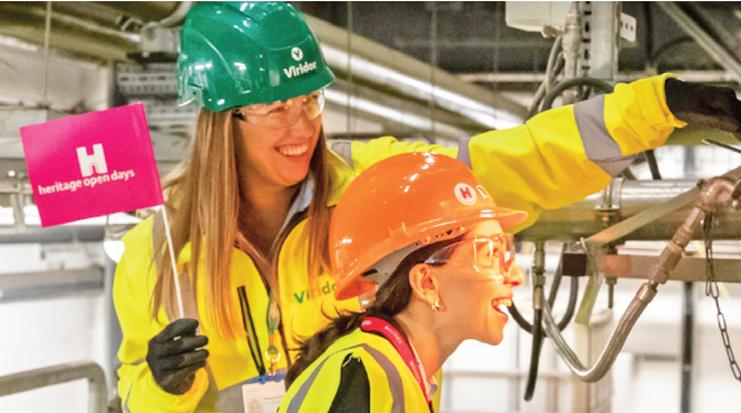
Heritage Open Days is England's largest community led festival of history and culture, involving thousands of local volunteers and organisations. Every year in September it brings people together to celebrate their heritage, community and history. Stories are told, traditions explored, and histories brought to life. It’s an opportunity to see hidden places and try out new experiences.
Several notable churches in the Diocese of Leeds are taking part this year: Leeds Cathedral St Edward’s, Clifford St Joseph’s, Pontefract St Robert’s, Harrogate St Stephen’s, Skipton. All the events are free of charge and open to all. More details can be found by using the search facility on the Heritage Open Days website: https://heritageopendays.org.uk/ dioceseofleeds.org.uk
The Pope invites us to thank the “many politicians who carry out their duties with a will to serve, not of power.”
In The Pope Video for August, Pope Francis invites us to pray for political leaders, that they might “work for the common good.”
In the video message that accompanies his prayer intention, the Pope affirms that even though “politics doesn’t have a very good reputation, it is much more noble than it appears.”
The Pope also invites us to thank the “many politicians who carry out their duties with a will to serve, not of power.”
A world without politics?
“Today, politics doesn’t have a very good reputation: corruption, scandals, distant from people’s day-to-day lives.” In his message introducing his prayer intention this month, the Pope’s opening words seem to say what many
of us are thinking – that politics is a dirty business in the hands of those who only think of getting rich or holding power. In the eyes of the normal person, those who dedicate themselves to politics should be viewed with suspicion – it’s taken for granted they have some hidden personal interest.
Nevertheless, as the video goes by, it becomes clear that Pope Francis is saying something different. He is reminding us all that another type of politics is always possible, a “POLITICS with all capital letters,” as he calls it, at the service of the people, in particular, of the poorest. We all need “good politics,” Pope Francis highlights, if we want to “move ahead toward universal fraternity.” The temptation to get rid of politics, often raised by populists of every type, is a huge delusion.
A service of charity for the people
Politics can be challenging to the moral character of those who participate in it. Nevertheless, it can also be a vocation worthy of holiness and virtue. In this regard, at the beginning of the video, the Pope recalls the words of Pope Paul VI who defined politics as “one of the highest forms of charity because it seeks the common good.”
It’s a matter of a social consciousness that overcomes individualism in favor of a greater good – the people. This is why Christians, especially the laity, are called to participate in political life, to collaborate in building a more just and supportive society. “Individuals can help others in need, when they join together in initiating social processes of fraternity and justice for all, they enter the ‘field of charity at its most vast, namely political charity.’” Pope Francis wrote, reflecting on this theme in his encyclical Fratelli Tutti (2020).
At the service of the poor
In his message, Pope Francis asserts that good politics is not “holed up in huge buildings with large hallways,” but “listens to what is really going on,” is “at the service of the poor,” and is “concerned about the unemployed.”
When a politician does not allow space for dialogue, cooperation and the commitment to the dignity of people – key aspects that the Pope emphasizes in Fratelli Tutti – the integral development of society is not achieved. Problems such as hunger, poverty, war, or the environmental crisis, to name a few, continue to be exacerbated due to egotistical and power hungry political leadership.

CRYPTIC Across
7 Book about a Norseman on Latin (6)
8 Philistine town where a quiet religious academic's hosting a ball (6)
9 A-lister, one that shines, wise men follow (4)
10 Woman's bad times with those in an early sect (8)
11 King of Jerusalem's barren victory (7)
12 Draw a holy place for Muslims (5)
15 Promote Tottenham's home theme (5)
17 Two containers I split are for the church in Rome (7)
20 One with a Uniat community girl returns, staying in touch (8)
22 Council beginning at Arles gets Dijon epilogue (4)
23 Get girl, university student, in a classical bear hug (6)
24 Syrian soldier's cured Indian bread mother tucks into (6)
CRYPTIC Down
1 National Theatre-Shakespeare character's elevated South American saint (8)
2 Abbot of Rievaulx's distress, getting flushed (6)
3 Chap's name's changed by Necho; the priest's goal is protecting the king (7)
4 The bridge between Ruth and 2 Samuel? (5)
5 Site of homage at quiet river in Spain (6)
6 Spare St Thomas? (4)
13 Abraham, for example, had clean resolution (8)
14 Women on right to be brought up in a 6th century archbishopric (7)
16 Book for the going... (6)
18 ...and the coming? (6)
19 Had Ulster divided, all over Jacob's daughter (5)
21 Account about a battle in the Crusades (4) QUICK Across
7 One of the four Major Prophets (6)
8 Philistine city taken by Uzziah and later restored by Herod the Great (6)
9 ---- of David, insignia of Jewish identity (4)
10 Early Christian sect members who aimed to return to innocence through nudity (8)
11 Archbishop of Canterbury, 1184-90, who died on the Third Crusade (7)
12 Muhammad's birthplace (5)
15 Sacred choral anthem (5)
17 ------- City, the world's smallest country by area (7)
20 One of a Syrian Uniat community, in formal communion with the RC Church since 1182 (8)
22 Council of 560, from which 47 genuine canons are preserved (4)
23 Romano-British 'saint', removed from the Catholic calendar of saints in its 1969 revision (6)
24 Syrian army officer healed of leprosy by Elisha (6)
QUICK Down
1 South American capital named after one of the apostles (8)
2 Abbot of Rievaulx, 1147-67 (6)
3 Steward n the household of Hezekiah (7)
4 Woman raped by Amnon and avenged by her brother Absalom (5)
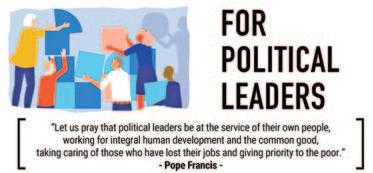
The challenges of politics Father Frédéric Fornos S.J., International Director of the Pope’s Worldwide Prayer Network, asks, “Pray for political leaders? Political leaders are who we make of them. Instead of fueling contempt for them with our words and thoughts, let’s help them to be the men and women we would like them to be. Let’s pray for them, as Pope Francis invites us to do. What courage it takes to be where they are and to try to live uprightly. They invest themselves totally: their time, their family life, their capabilities, their physical energy, their reputation…. How easy it is to think, “it’s greed, it’s power, it’s money, it’s their ego.” At times that is true. But at the same time, there are many who truly serve the common good. And us? What are we doing? What would we do in their place? The least we can do is pray for them.”
To watch the video, visit thepopevideo.org

5 Site of homage on a pilgrimage (6)
6 Saint (1478-1535), Lord Chancellor of Henry VIII's England (4)
13 Relating to Aramaic-speaking people of Babylonia (8)
14 Italian city, overrun by invaders after the fall of Rome, made an archbishopric in the 6th century (7)
16 Second book of the Pentateuch (6)
18 Major OT prophet (6)
19 Daughter of Jacob and Leah (5)
21 Important Crusader base experiencing sieges in 1189-91 and 1291 (4)